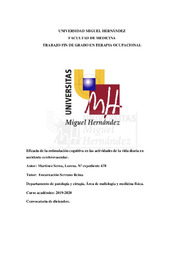Por favor, use este identificador para citar o enlazar este ítem:
https://hdl.handle.net/11000/25783Registro completo de metadatos
| Campo DC | Valor | Lengua/Idioma |
|---|---|---|
| dc.contributor.advisor | Serrano Reina, Encarnación | - |
| dc.contributor.author | Martínez Serna, Lorena | - |
| dc.contributor.other | Departamentos de la UMH::Patología y Cirugía | es_ES |
| dc.date.accessioned | 2022-01-28T09:51:36Z | - |
| dc.date.available | 2022-01-28T09:51:36Z | - |
| dc.date.created | 2019-11-29 | - |
| dc.identifier.uri | http://hdl.handle.net/11000/25783 | - |
| dc.description.abstract | Antecedentes: Las víctimas de accidentes cerebrovasculares a menudo experimentan alteraciones cognitivas insidiosas. Por ende, tienen mayor probabilidad de desarrollar un deterioro cognitivo acelerado tras el accidente o años posteriores al evento los cuales, perjudican o afecta gravemente al desarrollo de las actividades de la vida diaria. El objetivo principal de esta revisión es comprobar la eficacia de la estimulación cognitiva en las AVD en personas con ACV. Métodos: revisión bibliográfica. En las bases de datos de PubMed, Scielo, Google Scholar y Cochrane. Se buscaron artículos relacionados con la estimulación cognitiva en el ACV y sus beneficios en las AVD. Se incluyeron aquellos artículos que fuesen publicados con fecha límite en 2009 y que tuviesen texto completo disponible. De los artículos seleccionados, se revisó el resumen y el texto completo de cada estudio. Resultados: se han seleccionado 7 resultados que cumplían con los criterios de inclusión. De este modo, se han extraído resultados determinados sobre la investigación. Tres de los estudios incluidos tratan sobre la eficacia de la estimulación cognitiva mediante la realidad virtual o softwares informáticos en comparación con las técnicas cognitivas convencionales. El resto, una revisión sistemática, un protocolo de estudio para un ensayo y dos estudios controlados aleatorios. Conclusiones: permiten comprobar la eficacia de la estimulación cognitiva para el reentrenamiento de las AVD en personas que han sufrido un ACV. Aunque es necesario realizar más investigaciones acerca de esta técnica. | es_ES |
| dc.description.abstract | Background: Stroke victims often experience insidious cognitive disturbances after stroke. Therefore, they are more likely to develop an accelerated cognitive deterioration after the accident or years after the event, which seriously impair or affect the development of daily life activities. The main objective of this literature review is to verify the effectiveness of cognitive stimulation in the re-education of daily life activities in people with stroke. Methods: Bibliographic review. In the databases of PubMed, Scielo, Google Scholar and the Cochrane library. Items related to cognitive stimulation in stroke and its benefits in the activities of daily life were sought. Articles that were published with a deadline in 2009 and that had full text available were included. Of the selected articles, the summary and full text of each study were revised. Results: 7 results have been selected that met the inclusion criteria. In this way, certain results on the investigation have been draw. Three of the studies included deal with the effectiveness of cognitive stimulation through virtual reality or computer software compared to conventional cognitive techniques. The rest, a systematic review, a study protocol for a trial and a randomized controlled study. Conclusions: to test the effectiveness of cognitive stimulation for the retraining of daily life activities in people who have suffered a stroke. Although more research ir needed on this technique | es_ES |
| dc.format | application/pdf | es_ES |
| dc.format.extent | 21 | es_ES |
| dc.language.iso | spa | es_ES |
| dc.publisher | Universidad Miguel Hernández | es_ES |
| dc.rights | info:eu-repo/semantics/openAccess | es_ES |
| dc.rights.uri | http://creativecommons.org/licenses/by-nc-nd/4.0/ | * |
| dc.subject | Accidente cerebrovascular | es_ES |
| dc.subject | Estimulación cognitiva | es_ES |
| dc.subject | Actividades de la vida diaria | es_ES |
| dc.subject | Stroke | es_ES |
| dc.subject | Cognitive therapy | es_ES |
| dc.subject | Activities of daily living | es_ES |
| dc.subject.other | CDU::6 - Ciencias aplicadas | es_ES |
| dc.title | Eficacia de la estimulación cognitiva en las actividades de la vida diaria en accidente cerebrovascular. | es_ES |
| dc.type | info:eu-repo/semantics/bachelorThesis | es_ES |

Ver/Abrir:
PDF TFG.pdf
804,46 kB
Adobe PDF
Compartir:
 La licencia se describe como: Atribución-NonComercial-NoDerivada 4.0 Internacional.
La licencia se describe como: Atribución-NonComercial-NoDerivada 4.0 Internacional.
.png)